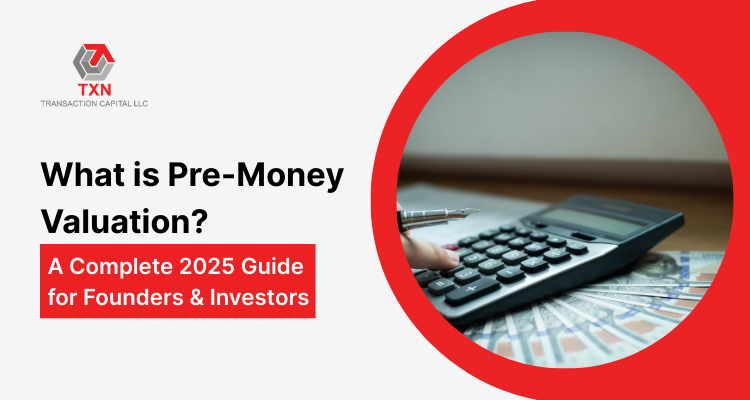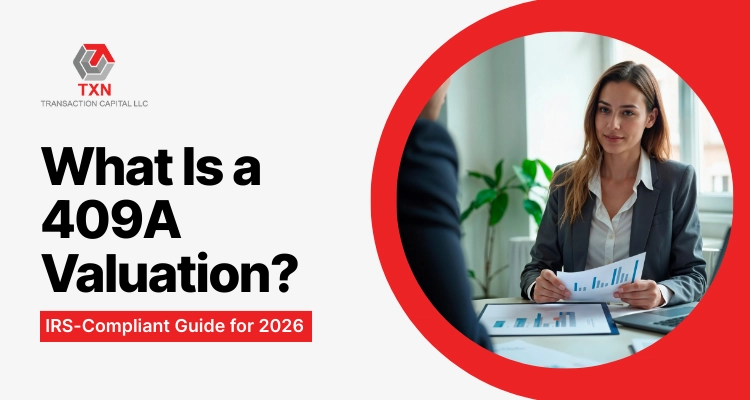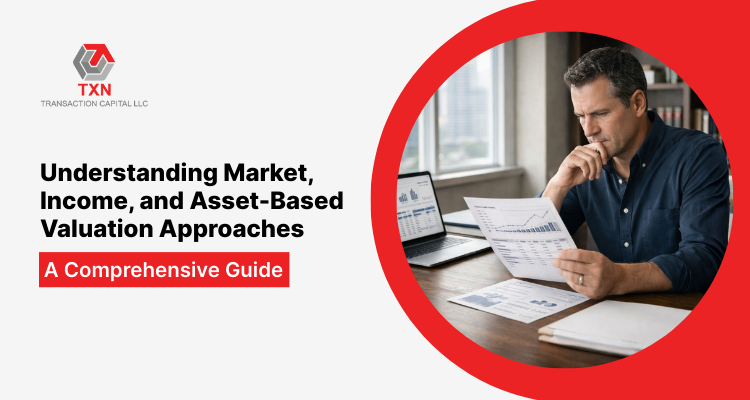What is Pre-Money Valuation? A Complete 2026 Guide for Founders & Investors

Within the competitive landscape of entrepreneurship and investment capital, knowing your startup's true value isn't just recommended—it's absolutely critical for success. Among the most crucial concepts you'll encounter during fundraising activities is pre-money valuation.
Whether you're an entrepreneur seeking your initial funding round or an angel investor evaluating investment opportunities through pitch presentations, this metric significantly impacts ownership distribution, company control, and deal negotiation outcomes. However, despite its importance, this concept is frequently misinterpreted or oversimplified in practice.
This comprehensive guide will thoroughly explain pre-money valuation fundamentals, demonstrate calculation methodologies, explore its impact on fundraising success, and highlight key considerations for both entrepreneurs and investors.
What Is Pre-Money Valuation?
Pre-money valuation represents your startup's estimated worth immediately before receiving new investment funding. This critical figure determines how much equity you'll surrender to investors and shapes every aspect of your fundraising negotiations.
Consider this simple scenario: if your startup has a pre-money valuation of $6 million and you raise $2 million in funding, the post-money valuation becomes $8 million. This means the investor owns 25% of your company ($2M ÷ $8M = 25%). This straightforward calculation underlies some of the most crucial negotiations between startups and investors.
For founders seeking investment or investors evaluating opportunities, understanding pre-money valuation isn't just helpful—it's absolutely essential for making informed decisions that protect your interests.
Why Does Pre-Money Valuation Matter More Than Ever in 2026?
1. For Startup Founders
- Controls ownership dilution during funding rounds
- Sets expectations for future investment rounds
- Influences board control and decision-making power
- Impacts employee stock option pools and team incentives
2. For Investors and VCs
- Determines equity percentage acquired for investment amount
- Calculates potential returns on investment exit
- Benchmarks risk-to-reward ratios across portfolio companies
- Guides investment thesis and sector allocation strategies
The pre-money valuation essentially becomes the foundation upon which your entire investment relationship is built.
How Do You Calculate Pre-Money Valuation? (Step-by-Step)
The Basic Formula
Pre-Money Valuation = Post-Money Valuation - Investment Amount
Real-World Calculation Example
Let's examine FarmStack, an agri-tech platform helping farmers track crop health via AI technology:
Given Information:
- Outstanding shares: 1.5 million
- Seeking investment: $1.5 million
- Negotiated post-money valuation: $8 million
Calculation Steps:
- Pre-Money Valuation: $8M - $1.5M = $6.5 million
- Price Per Share: $6.5M ÷ 1.5M = $4.33 per share
- New Shares Issued: $1.5M ÷ $4.33 = 346,652 shares
- Investor Ownership: 346,652 ÷ (1.5M + 346,652) = 18.75%
This mathematical relationship forms the backbone of every startup funding negotiation.
What's the Difference Between Pre-Money and Post-Money Valuation?
| Feature | Pre-Money Valuation | Post-Money Valuation |
|---|---|---|
| Timing | Before investment | After investment |
| Purpose | Sets founder equity baseline | Calculates investor equity |
| Formula | Post-money − Investment | Pre-money + Investment |
| Relevance | Important for founders | Important for investors |
Critical Negotiation Tip
Always ask if the valuation being discussed is pre-money or post-money—this single word can change ownership calculations significantly. Many negotiation misunderstandings stem from parties assuming different valuation frameworks during discussions.
Which Factors Influence Pre-Money Valuation in 2026?
1. Market Size and Opportunity
Startups targeting trillion-dollar markets like healthcare technology, renewable energy, or financial services typically command higher pre-money valuations due to massive growth potential.
2. Management Team Track Record
Experienced founders with previous successful exits, domain expertise, or strong advisory boards often secure 20-40% higher valuations compared to first-time entrepreneurs.
3. Traction Metrics and Performance
Key performance indicators that boost valuation include:
- Revenue growth rates exceeding industry benchmarks
- Customer acquisition metrics showing scalable growth
- Product-market fit indicators like user retention and engagement
- Partnership agreements with established market players
4. Comparable Company Analysis
5. Market Dynamics and Competition
Multiple interested investors create competitive tension, often driving valuations higher. Conversely, limited investor interest may require more conservative valuation expectations.
How Does Pre-Money Valuation Affect Deal Terms?
Preferred Share Structures
Investors typically receive preferred shares that include:
- Liquidation preferences ensuring return of investment before common shareholders
- Anti-dilution protection maintaining ownership percentages in down rounds
- Participation rights allowing sharing in exit proceeds beyond preference amounts
SAFE Notes and Convertible Instruments
When parties cannot agree on current valuation, alternative structures include:
SAFE (Simple Agreement for Future Equity):
- Converts to equity in future priced rounds
- Often includes valuation caps and discount rates
- Delays valuation decisions to later funding stages
Convertible Notes:
- Structured as debt converting to equity
- Includes interest rates and maturity dates
- Provides investor downside protection
What Is Dilution and How Does Pre-Money Valuation Impact Ownership?
Understanding Dilution Mechanics
Dilution occurs when new shares are issued, reducing existing shareholders' ownership percentages. The pre-money valuation framework directly influences dilution calculations.
Pre-Money vs. Post-Money ESOP Treatment
Pre-Money ESOP (Employee Stock Option Pool):
- Option pool increases count toward pre-money valuation
- Founders absorb dilution from employee equity
- Results in higher effective dilution for founding team
Post-Money ESOP:
- Option pool created after investment
- Dilution shared between founders and investors
- Generally more favorable for founding teams
Factors Amplifying Dilution
- Fully diluted capitalization including all outstanding securities, options, warrants, and convertible instruments
- Large option pools reserved for future employee grants and advisor equity
- Multiple convertible instruments creating compound dilution effects when converting to equity
- SAFE note stacking where multiple unconverted SAFEs can cause unexpected dilution in priced rounds
Pro Tip: Founders should negotiate for post-money ESOP creation and understand SAFE stacking risk to minimize unexpected dilution. Multiple SAFE notes converting simultaneously can significantly dilute founder ownership beyond initial expectations.
What Are the Best Valuation Methods for Startups?
1. Market Approach Methods
Comparable Company Analysis (CCA):
- Analyzes public companies in similar industries
- Applies trading multiples to your financial metrics
- Most reliable for later-stage startups with substantial revenue
Precedent Transaction Analysis:
- Reviews recent M&A transactions in your sector
- Considers control premiums and strategic value
- Useful for understanding exit valuation potential
2. Income Approach Techniques
Discounted Cash Flow (DCF):
- Projects future cash flows and discounts to present value
- Requires detailed financial modeling and assumptions
- Best suited for startups with predictable revenue models
3. Early-Stage Specific Methods
Berkus Method:
- Assigns value to key startup risk factors
- Evaluates management, product, market, and execution
- Designed specifically for pre-revenue companies
Scorecard Valuation Method:
- Compares startup to funding averages in region/sector
- Adjusts based on relative strengths and weaknesses
- Provides systematic early-stage valuation framework
What Strategic Advice Should Founders Follow?
1. Master Your Valuation Narrative
Build compelling arguments supporting your valuation using:
- Industry research and market size data
- Competitive analysis and differentiation factors
- Financial projections with realistic assumptions
- Customer testimonials and pilot program results
2. Create Competitive Investment Environment
Multiple term sheets provide significant negotiation leverage:
- Approach several investor types simultaneously
- Maintain momentum through efficient due diligence
- Use competing offers to improve terms and valuation
3. Think Beyond Current Funding Round
Consider long-term implications:
- Avoid raising insufficient capital requiring bridge rounds
- Plan 18-24 months of runway minimum
- Maintain reasonable valuation progression for future rounds
4. Balance Ambition with Market Reality
While higher valuations seem attractive, consider:
- Down round risks if growth doesn't meet expectations
- Investor reputation and reference value
- Market timing and economic conditions
How Should Investors and Founders Negotiate Effectively?
Founder Negotiation Tactics
- Lead valuation discussions confidently with data-driven arguments
- Understand term sheet implications beyond just valuation numbers
- Know your walk-away point and alternative funding options
- Focus on post-money ESOP pools to minimize dilution
Investor Negotiation Strategies
- Propose fair valuations based on comparable analysis and metrics
- Use strategic valuation caps on SAFE notes and convertibles
- Align on long-term vision rather than optimizing for short-term returns
- Consider board composition and governance alongside valuation
What Are the Risks of Overvaluation?
Real-World Case Study: The Down Round Trap
Consider GreenSprout, a vertical farming technology company that learned this lesson the hard way:
Initial Success:
- Raised seed round at $12M pre-money valuation
- Strong initial traction and promising pilot programs
- Confident projections for rapid market expansion
Market Reality:
- Growth stalled due to technical challenges and market adoption issues
- Series A investors offered only $10M post-money valuation
- Triggered a painful down round with significant dilution
Devastating Consequences:
- Founders lost credibility with the investor community
- Early investors got hit with anti-dilution clauses
- Employee morale declined dramatically due to devalued stock options
- Future fundraising became substantially more challenging
Key Lesson
Sustainable valuation progression that reflects actual performance builds long-term value more effectively than optimistic early-stage pricing that cannot be supported by business results.
How Can Transaction Capital LLC Support Your Valuation Needs?
Expert Valuation Services
Transaction Capital LLC provides comprehensive startup valuation support through certified professionals holding ABV®, ASA, MRICS, and CVA® credentials.
Our Specialized Services Include:
- 409A Valuations starting at $500 for equity compensation compliance
- Startup Valuation Services for fundraising and strategic planning
- SAFE Note and Convertible Modeling for complex capital structures
- Business Valuation Services meeting audit and regulatory requirements
Why Choose Professional Valuation Support?
Professional valuations provide:
- Audit-defensible reports meeting IRS and SEC standards
- Investor credibility through independent third-party analysis
- Regulatory compliance for equity compensation and tax reporting
- Strategic insights based on 1,500+ completed valuations across 35+ industries
Conclusion: Align Valuation With Vision for Long-Term Success
Pre-money valuation serves as the cornerstone of successful startup fundraising, directly influencing equity ownership, investor relationships, and long-term company trajectory. Understanding this critical concept is far more than mastering a financial figure—it's about aligning your company's value proposition with your growth vision.
Essential Takeaways:
- For founders: Pre-money valuation shapes how much of your company you retain and controls dilution
- For investors: It sets expectations for risk assessment and potential returns on investment
- Understand the mathematical relationship between pre-money and post-money valuations
- Use multiple valuation methodologies to build compelling, data-driven investment narratives
- Balance ambitious growth projections with market reality to avoid down round risks
- Consider long-term dilution implications when structuring deals and negotiating terms
- Leverage professional valuation services for investor credibility and regulatory compliance
Mastering pre-money valuation means mastering startup fundraising fundamentals. Understand it, justify it with solid metrics, and negotiate it with confidence backed by professional expertise.
Ready to optimize your startup's valuation strategy? Transaction Capital LLC's certified valuation experts provide the comprehensive insights and audit-ready documentation you need for successful fundraising and sustainable growth.
Contact our team for a free 15-minute consultation and discover how proper valuation can accelerate your growth journey while protecting your interests.
Frequently Asked Questions About Pre-Money Valuation

Dr. Gaurav B.
Founder & Principal Valuer, Transaction Capital LLC
Specialist in IRS-Compliant 409A & Complex Valuation Matters
Dr. Gaurav B. is the Founder and Principal Valuer of Transaction Capital LLC, a valuation and financial advisory firm providing independent, standards-based valuation opinions for startups, growth-stage companies, and established enterprises.




